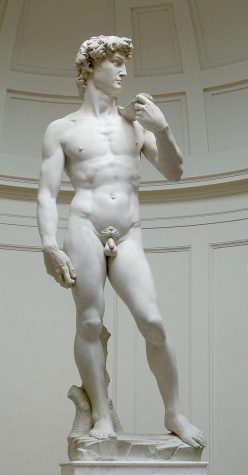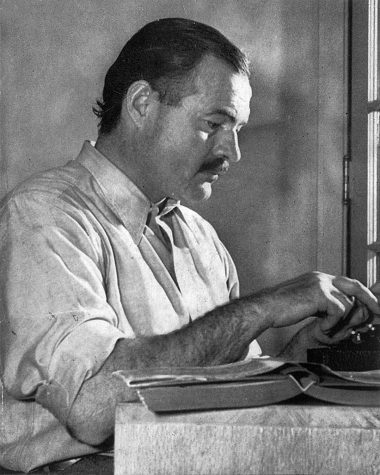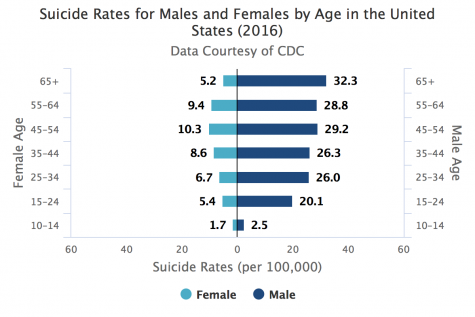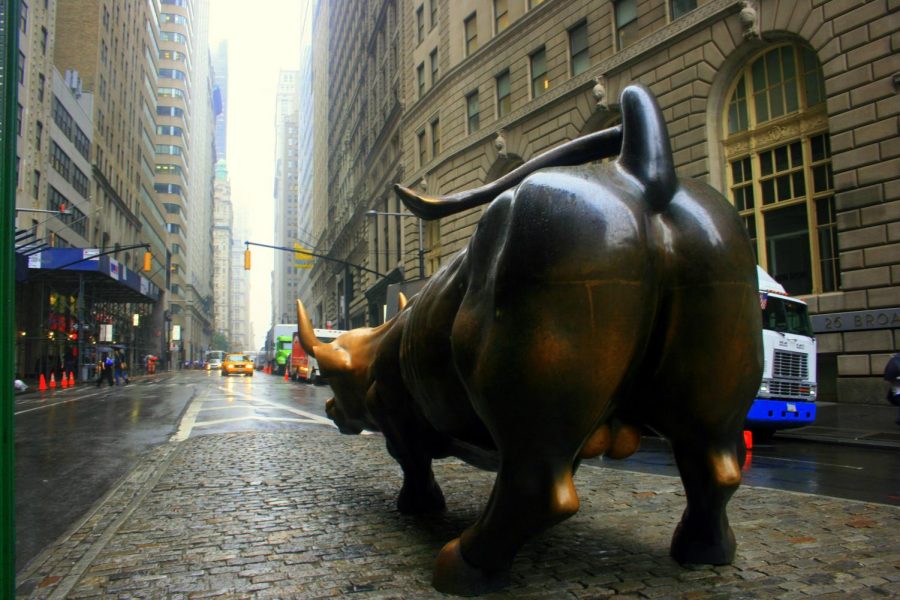Challenging the dangers of toxic masculinity
(Damn right my boys can swim!)
Dangling for all to see, the Wall Street Bull’s testicles roar out, “Damn right my boys can swim.” Our capitalistic men thrive on aggression, strength and brutal force. Has competition and the masculine ideal corrupted what it means to be a man?
January 30, 2019
My penis was chiseled out of marble by the hand of God himself.
When I bleed, I don’t cry. I’m no sissy. Women are conquests. Men are threats. There’s power in my stride, intensity in my stare and furor in my fists. I carry an emotion-proof veneer with distant abandon. I must hide the hollow fear and lonely isolation destroying me from within.
Is this the best a man can get?

Gillette is the latest brand to face criticism for taking a political stance. To challenge toxic masculinity, their advertisement depicts male bullying, workplace sexism, sexual harassment and aggressive male behavior.
The public backlash doesn’t surprise College of DuPage Professor of Sociology Matthew Green.
“The criticism is strong because some men feel the attack is against them personally and against their individual character,” said Green. “When people feel their identity is threatened they fight back.”
To address male accountability, Gillette reworded their famous slogan to “The best men can be.” They highlight men confronting others on their inappropriate behavior and fathers teaching against the traditional “boys will be boys” mentality.
Gillette finishes, “It’s only by challenging ourselves to do more that we can get closer to our best.”
Green credits the #MeToo movement for inspiring social awareness and action.
“People are becoming more aware of a culture of sexual harassment. Future generations of men are being raised with heightened sensitivity,” said Green.
Challenging men to take a long look in the mirror, the ad propositions: is toxic masculinity feminist propaganda, or is it a serious societal problem?
Critics have called for a boycott, with television personality Piers Morgan tweeting Gillette wanted men to, “take one of their razors and cut off their testicles.”
Critical voices fail to see how the toxic masculine ideal is not only detrimental towards equality for women but also is devastating upon the individual male character.
Celebrating a mythological Spartan ideal of masculinity, men and boys are suppressed and perverted into casts of societal expectations. Boys are required to be tough, aggressive, sexually potent and to eschew feminine characteristics that would make them appear weak.
In conditioning conformity over individualism, repressed emotions and anxieties can lead to depression, angst and a failure to discover our true personal identities. Vulnerability is denounced as weakness leading to social isolation and a deficiency in communicating effectively. Boys never acquire the skills to formulate healthy relationships with friends and the opposite sex.
Green believes gender identity is socially constructed and the traditional hyper-masculine ideal is an unattainable standard.
“There is a spectrum of identity, and very few people truly identify with the hyper-masculine or hyper-feminine personality,” said Green. “Most of society lies somewhere between. Men have been taught that to be a man you must live up to this traditional archetype. In its extremity, it leads to toxic examples of hyper-aggression, hyper-violence and sexual objectification.”
Green believes most men do not believe they’ve been sociologically conditioned, and the first step towards rehabilitation is awareness.
“As a parent, a family member or a friend, we need to communicate to boys how problematic the hyper-masculine ideal can be.
“We need to dispel that violence and aggression can solve problems, emotions are signs of weakness, and men are superior to women. Just as they have been social-conditioned, bad behavior can be unlearned as well,” said Green.

By gratifying aggression and competition, boys have become conditioned to position themselves in an illusory male hierarchy. The most extreme hyper-dominant alphas are positioned on top, while boys try to ascend by proving their toughness and avoid appearing weak. Feats of strength and tests of manliness result in masculine traits being over-emphasized by the individual.
The higher their status, the more illusory power they claim over weaker males and women. This results in escalated homophobia, violence, sexism and marginalization of boys who don’t fit the archetype.
The compulsion to avoid exclusion inspires the complicity of inappropriate behavior to avoid appearing effeminate.
“The herd mentality plays upon group dynamics, and it’s very difficult to challenge the collective way of thinking,” said Green. “One must maintain the strength in their individuality and not conform to group pressures. If you fail to follow their hyper-masculine behavior, the group often ostracizes you with attacks of weakness.”
Green argues the male-hierarchy belief is a zero-sum approach because it positions men over one another and insinuates natural competition.
Buying into the hierarchy leads men to enshrine the value of their egos. In an effort to appear tough, any affront to their ego must be met with forceful action. Failure and rejection insult their manhood leading to aggression as their only solution.
Green believes the protection of male ego plays out in the hyper-masculine expectation of sexual entitlement. As women become objectified, men feel entitled to receive sexual favors without refusal. Affronts to their ego predictably lead to aggression. He believes this false superiority promotes lack of respect and prevents equality for all.
Sociologists label the aggression as a symptom of “identity threat.” Studies point to an exaggeration of hyper-masculine traits when an individual feels their manhood is being threatened.
A 2013 study by the American Journal of Sociology found men were more likely to support violence, homophobia and male supremacy when their masculinity was threatened. A similar study in the Journal of Violence Against Women found individuals disproportionality blamed victims of sexual assault and exonerated the perpetrator.
Green referenced studies of men working traditional feminine occupations. Feeling emasculated, men would over-compensate with hyper-masculine traits in other areas of their lives.
“If a partner does something to affront his sense of masculinity – whether intentional or not – she could just make more money than he does, the man views it as an insult against their worth,” said Green. “This often leads to eruptions, whether physically or emotionally.”
By shunning and reprimanding feminine emotions, young men are prevented from learning how to create and maintain fully-functioning complex relationships. A void of empathy results in suppression and emotional isolation.
Men are prohibited from forming empathetic relationships with other males and are kept at a distance from their own self-worth.
By building up a false hyper-masculine ideal, men fail to explore and come to terms with the truths of their real self-identity. Self-realization becomes an eternal struggle of suppression, anxiety and not knowing when, or how, to call out for help.
According to the U.S. National Institute of Mental Health, suppression of emotions and anxieties leads to depression and contributes to the significant number of male suicides under the age of 45.
The male struggle with vulnerability coupled with the conditioned impulse towards unnecessary and dangerous risk-taking perverts the sense of self-worth. Personal identity and the socially-excepted ideal remain in constant conflict until a potentially devastating resolution is found.

The National Institute of Mental Health documents the severe gender disparity between victims of suicide across all age groups
Green referenced sociologist Emile Durkheim’s studies into the higher suicide rates among men over women in 19th century French society.
“Across generations and societies, men are prone to suicide because they are taught not to confide in others or show emotional signs of weakness,” said Green. “This lack of social connection between others results in all their troubles being bottled inside.
“If you believe in hyper-masculine ideals, what happens if you lose your job? What happens if you cannot support your family? Many would feel they are no longer a man if they cannot provide for their family. They are conditioned to believe, if they are no longer a man, why even live?”
Acknowledging the hazardous personal deficiencies toxic masculine ideals inspire, the American Psychological Association released its first guidelines for psychologists to help boys and men confront and challenge the traditional masculinity ideology.
Psychologists are now teaching boys to celebrate their individuality and avoid submitting to conformity. They are trying to establish an appreciation for divergence and an acceptance for personal complexities. Boys and men are taught to explore their self-realization and come to empathize with their true identities.
By teaching boys to empathize with others and themselves, psychologists hope to mollify the disproportionate risk boys face for school discipline, academic challenges and health disparities, including cardiovascular problems and substance abuse.
Green hopes as culture evolves to appreciate greater sensitivity, our perceptions on gender identity will also change in a positive direction.
Hoping to inspire the next generation of sensitive, empathetic and complex men, Gillette has partnered with The Boys and Girls Club of America. Gillette hopes continued action and awareness will help develop young men with better social and communication skills.
Inspiring the next generation comes with one courageous act of strength and bravery at a time. Challenging generations of hyper-masculine idealization will come with significant opposition from those who fear power being taken from their manhood.
However, only in discovering the many equal ways of expressing masculinity, can we ever discover the true strength and value of the best men can be.




















